NOTE: Please don't disregard based on the title being similar to others.
I'm trying to share a folder on a Windows 7 machine. And I want to give everyone full permissions to it via C#.
I've seen several articles on other pages including here, that tell how to do it. But like some others, it doesn’t work for me. Below is a snippet taken from SO.
DirectorySecurity sec = Directory.GetAccessControl(path);
// Using this instead of the "Everyone" string means we work on non-English systems.
SecurityIdentifier everyone = new SecurityIdentifier(WellKnownSidType.WorldSid, null);
sec.AddAccessRule(new FileSystemAccessRule(everyone, FileSystemRights.FullControl | FileSystemRights.Synchronize, InheritanceFlags.ContainerInherit | InheritanceFlags.ObjectInherit, PropagationFlags.None, AccessControlType.Allow));
Directory.SetAccessControl(path, sec);
Sharing the folder is already done before I invoke the code above. The below images are the results of what i get:

So far, so good. But on the next image you'll see that the the two remaining checkboxs are still unchecked.

What am I missing please?
Thanks!
EDIT: Below is the code used to do the actual sharing.
private static void QshareFolder(string FolderPath, string ShareName, string Description)
{
try
{
ManagementClass managementClass = new ManagementClass("Win32_Share");
ManagementBaseObject inParams = managementClass.GetMethodParameters("Create");
ManagementBaseObject outParams;
inParams["Description"] = Description;
inParams["Name"] = ShareName;
inParams["Path"] = FolderPath;
inParams["MaximumAllowed"] = null;
inParams["Password"] = null;
inParams["Access"] = null;
inParams["Type"] = 0x0; // Disk Drive
// Invoke the method on the ManagementClass object
outParams = managementClass.InvokeMethod("Create", inParams, null);
// Check to see if the method invocation was successful
if ((uint) (outParams.Properties["ReturnValue"].Value) != 0)
{
throw new Exception("Unable to share directory.");
}
}
catch (Exception ex)
{
MessageBox.Show(ex.Message, "error!");
}
}